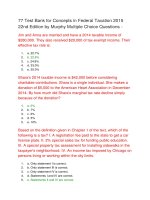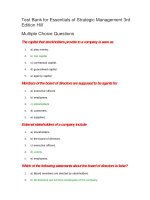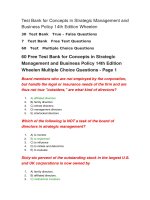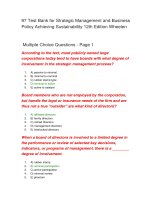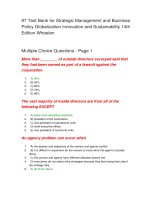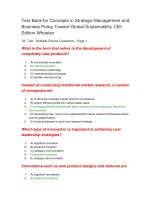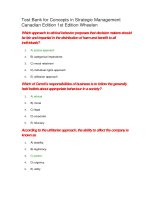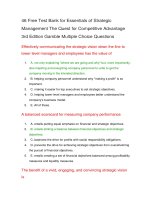Test bank for concepts in strategic management and business policy toward global sustainability 13th edition wheelen
Bạn đang xem bản rút gọn của tài liệu. Xem và tải ngay bản đầy đủ của tài liệu tại đây (138.08 KB, 23 trang )
Test Bank for Concepts in Strategic Management and
Business Policy Toward Global Sustainability 13th
Edition Wheelen
78 Test Multiple Choice Questions - Page 1
What is the term that refers to the development of completely
new products?
1.
2.
3.
4.
5.
A) incremental innovation
B) radical innovation
C) innovative technology
D) manufacturing technology
E) flexible manufacturing
Instead of conducting traditional market research, a number
of companies are
1.
2.
3.
A) conducting untested market research procedures.
B) simply following what the market leader does.
C) probing potential markets with early versions of new products to see which
have potential.
4. D) developing new, much more sophisticated market research techniques which
involve global testing.
5. E) forming alliances to pool their research findings.
Which type of innovation is important in achieving cost
leadership strategies?
1.
2.
3.
4.
5.
A) logistical innovation
B) product innovation
C) category one innovation
D) process innovation
E) category two innovation
Innovations such as new product designs and features are
1.
2.
3.
4.
5.
A) logistical innovations.
B) product innovations.
C) category one innovations.
D) process innovations.
E) category two innovations.
A study by Kuczmarski & Associates revealed that ________
of all newly introduced products were still being sold
five years later.
1.
2.
A) 21%
B) 35%
3.
4.
5.
C) 56%
D) 80%
E) 95%
The first phase of the lead user process is
1.
2.
3.
4.
5.
A) determining the trends.
B) identifying lead users.
C) laying the foundation.
D) developing the breakthrough.
E) hosting seminars.
The involvement of the customer in the commercialization of
a new technology is known as
1.
2.
3.
4.
5.
A) lead technology.
B) co-development.
C) technology customization.
D) developmental manufacturing.
E) technological continuity.
Innovations such as improved manufacturing facilities,
increasing product quality, and faster distribution, are
1.
2.
3.
4.
5.
A) logistical innovations.
B) product innovations.
C) category one innovations.
D) process innovations.
E) category two innovations.
An extension of a product can be referred to as
1.
2.
3.
4.
5.
A) incremental innovation.
B) novel innovation.
C) incentive innovation.
D) strategic innovation.
E) radical innovation.
Research by Von Hippel indicates that 77 percent of the
innovations in the scientific instruments industry
come from
1.
2.
3.
4.
5.
A) the needs of the supplier.
B) the needs of the employees.
C) the needs of the customers.
D) the needs of the shareholders.
E) the needs of the corporation itself.
Research by Hitt, Hoskisson, and Harrison indicates that the
maximum innovator in an industry tends to be
1.
2.
3.
4.
5.
A) the smallest firm.
B) the largest firm.
C) the middle-sized firm.
D) the newest firm.
E) the one with the largest R&D department.
Software firms know that in order to remain on the leading
edge of technology, they must have a programming
presence in
1.
2.
3.
4.
5.
A) Silicon Valley, California.
B) Austin, Texas.
C) Fayetteville, Arkansas.
D) New York, New York.
E) Los Angeles, California.
The effort to talk with users at the leading edge of the target
and related market to understand their needs is
indicative of which phase in the lead user process?
1.
2.
3.
4.
5.
A) determining the trends
B) identifying lead users
C) laying the foundation
D) developing the breakthrough
E) hosting seminars
Besides the users of the products, helpful advances toward
innovations are derived from
1.
2.
3.
4.
5.
A) suppliers.
B) employees.
C) shareholders.
D) government regulators.
E) lobbyists.
A study of the impact of technological discontinuity in
various industries revealed that the leading firms failed
to switch to the new technology because
1.
2.
3.
4.
5.
A) management was ignorant of the new development.
B) it was too expensive.
C) they listened too closely to their current customers.
D) of government regulations.
E) they did studies which revealed that the new technology was inferior to the
current technology.
Imitating new products developed by pioneers, refining
them, and outmarketing the competition is a process
known as
1.
2.
3.
4.
5.
A) embrace and extend strategy.
B) no change strategy.
C) first to market strategy.
D) hold strategy.
E) refinement strategy.
According to the textbook, the watch maker that introduces
hundreds of new models of watches into the
marketplace then makes more of the models that sell,
dropping those that don't sell is
1.
2.
3.
4.
5.
A) Timex.
B) Wittnauer.
C) Swatch.
D) Seiko.
E) Pulsar.
The consulting firm Arthur D. Little found that the use of
standard market research techniques has resulted in a
success rate for new cereals of
1.
2.
3.
4.
5.
A) over 92%.
B) only 8%.
C) around 75%.
D) 50%.
E) around 25%.
For a lead user team, what is the minimum duration of each
phase in the process?
1.
2.
3.
4.
5.
A) one day
B) one week
C) three weeks
D) four weeks
E) eight weeks
Confirming that R&D spending can be wasted, between 1950
and 1979, which country's steel industry spent 20%
more money on plant maintenance and upgrading for
each ton of production capacity added or replaced
than did the Japanese steel industry?
1.
A) United States
2.
3.
4.
5.
B) Sweden
C) Germany
D) France
E) Korea
A study of 111 successful and 86 unsuccessful product
innovations found that the successful innovations had
some of which of the following features?
1.
2.
3.
4.
5.
A) They were moderately new to the market.
B) They were based on tried-and-tested technology.
C) They saved money, met customer needs, and supported existing practices.
D) all of the above
E) none of the above
Which type of innovation is important in achieving
differentiation strategies?
1.
2.
3.
4.
5.
A) logistical innovation
B) product innovation
C) category one innovation
D) process innovation
E) category two innovation
Lead user teams are typically composed of employees from
the
1.
2.
3.
4.
5.
A) accounting department.
B) marketing department.
C) technical department.
D) finance department.
E) marketing and technical departments.
In the early stages of a product's life cycle, ________ are
most important.
1.
2.
3.
4.
5.
A) process innovations
B) product innovations
C) cost leadership strategies
D) improved manufacturing facilities
E) faster distribution
Based on the lead user team process, what company was
able to successfully implement this process in eight of
its 55 divisions?
1.
2.
3.
4.
A) 3M
B) Corning
C) Microsoft
D) America Online
5.
E) General Electric
What technology(ies) was the catalyst for the United States
to lose its market share of the world steel market when
they were not recognized and adopted?
1.
2.
3.
4.
5.
A) flexible manufacturing
B) reengineering
C) assembly line manufacturing
D) basic oxygen furnace and reengineering
E) basic oxygen furnace and continuous casting
Time to market is an important consideration in the
management of technology because
1.
2.
3.
A) cycle times are getting longer.
B) technology management is a discontinuous business.
C) 60% of successful patented innovations are imitated within four years at 65% of
the cost of the innovation.
4. D) R&D budgets are becoming a higher proportion of total revenues in most large
corporations.
5. E) the distinction between process and product R&D is becoming blurred.
According to research conducted by Forbes and others, the
most important driver of corporate value for both
durable and non-durable companies is said to be
1.
2.
3.
4.
5.
A) mass customization.
B) innovation.
C) synergy.
D) logistics.
E) flexible manufacturing.
According to one study cited in the textbook, what is the
innovation rate of small businesses?
1.
2.
3.
4.
5.
A) 200 innovations per million employees
B) 225 innovations per million employees
C) 275 innovations per million employees
D) 322 innovations per million employees
E) 350 innovations per million employees
What company was cited in the textbook as using the
embrace and extend strategy as a way to monitor the
competition for new developments?
1.
2.
3.
4.
A) Seiko
B) Microsoft
C) Maytag
D) Trilogy
5.
E) 3M
Companies, organizations, or individuals that are well ahead
of market trends and have needs that go far beyond
those of the average user are known as
1.
2.
3.
4.
5.
A) first to market benefactors.
B) traditionalists.
C) lead users.
D) strategic pursuers.
E) technological maneuvers.
What percentage of sales is spent on R&D for the computer
software and drug industries?
1.
2.
3.
4.
5.
A) between 11% and 13%
B) between 2% and 5%
C) between 18% and 20%
D) between 25% and 28%
E) between 41% and 44%
The corporation ________ was able to establish itself as the
industry standard for browsers.
1.
2.
3.
4.
5.
A) Netscape
B) Sun Systems
C) Apple Computers
D) Cisco Systems
E) Corel Works
A rule of thumb for R&D spending is that a corporation
should
1.
2.
3.
4.
5.
A) spend twice as much as the market leader.
B) spend half as much as the market leader.
C) spend the same as the market leader.
D) spend at a "normal" rate for that industry.
E) spend whatever it takes to build market share.
Information that assesses where breakthroughs are likely to
occur can be depicted on a
1.
2.
3.
4.
5.
A) technology chart.
B) technology strategic blueprint.
C) technology roadmap.
D) technology highway.
E) technology monograph.
Most new developments that threaten existing business
practices and technologies come from
1.
2.
3.
4.
5.
A) within one's own industry.
B) outside one's own industry.
C) one's current competitors.
D) within one's own corporation.
E) Bell Labs.
What company has been able to successfully use market
research in its survey of current users in directing
incremental improvements in existing products?
1.
2.
3.
4.
5.
A) 3M
B) Proctor and Gamble
C) BMW
D) General Motors
E) Chrysler
Approximately how much of the profits of all U.S. companies
come from products launched in the previous ten
years?
1.
2.
3.
4.
5.
A) 50%
B) 100%
C) 80%
D) 20%
E) less than 1%
What term refers to the time from inception to profitability of
a specific R&D program?
1.
2.
3.
4.
5.
A) duration of innovation
B) time to market
C) time to shelf
D) duration of R&D intensity
E) span of R&D
78 Free Test Bank for Concepts in Strategic
Management and Business Policy Toward Global
Sustainability 13th Edition Wheelen Multiple
Choice Questions - Page 2
Intrapreneurship is another name for
1.
2.
3.
A) entrepreneurship.
B) mentoring.
C) corporate entrepreneurship.
4.
5.
D) joint ventures.
E) strategic alliances.
A company should develop a technology INTERNALLY rather
than externally when
1.
2.
3.
4.
5.
A) the technology is of little significance to competitive advantage.
B) the supplier has proprietary technology.
C) the technology development process requires special expertise.
D) the technology development process requires new people and new resources.
E) technology is rare, valuable, hard to imitate and has no close substitutes.
The innovations which dominate the major home appliance
industry are
1.
2.
3.
4.
5.
A) financial innovations.
B) product innovations.
C) technological innovations.
D) process innovations.
E) category two innovations.
What is the term for a person who generates a new idea and
supports it through many organizational obstacles?
1.
2.
3.
4.
5.
A) orchestrator
B) conductor
C) sponsor
D) product champion
E) innovative champion
To improve its R&D effectiveness, Chrysler Corporation
1.
2.
3.
4.
5.
A) replaced its entire R&D Department.
B) introduced cross-functional teams.
C) began utilizing the index of R&D effectiveness.
D) hired scientists from its competition.
E) started using strategic alliances.
An organization's ability to use a new technology effectively
is called
1.
2.
3.
4.
5.
A) technological competence.
B) absorptive capacity.
C) technological continuity.
D) technology transfer.
E) index of R&D effectiveness.
What is the first stage of new product development?
1.
2.
A) idea generation
B) concept evaluation
3.
4.
5.
C) preliminary design
D) prototype build and test
E) final design and pilot production
Which organizational design for corporate entrepreneurship
occurs when the new business has uncertain strategic
importance and is only partly related to present
corporate operations?
1.
2.
3.
4.
5.
A) direct integration
B) special business units
C) new product business department
D) micro new-venture department
E) new venture division
Which organizational design for corporate entrepreneurship
occurs when an entrepreneurial proposal might not be
important strategically to the corporation but is
strongly related to present operations and top
management might help the entrepreneurial unit to
spin-off from the corporation?
1.
2.
3.
4.
5.
A) nurturing and contracting
B) micro new-venture department
C) new venture division
D) new product business department
E) complete spin-off
The traditionally heavy emphasis by U.S. major home
appliance manufacturers on ________ is one reason
they have such a strong position in the North
American market.
1.
2.
3.
4.
5.
A) technology sourcing
B) technology continuity
C) technology discontinuity
D) process innovation
E) product innovation
Following the resource-based view of the firm, a company
should ________ technologies that are commonly
available but ________ those that are rare, valuable,
and hard to imitate and that have no close substitutes.
1.
2.
3.
A) buy; license
B) buy; make
C) make; license
4.
5.
D) make; acquire firms producing
E) none of the above
What percent of their R&D budgets do U.S. firms spend on
process R&D?
1.
2.
3.
4.
5.
A) 30%
B) 50%
C) 60%
D) 70%
E) 90%
A department manager who recognizes the value of an idea,
helps obtain funding to develop the innovation, and
facilitates its implementation is called a(n)
1.
2.
3.
4.
5.
A) orchestrator.
B) conductor.
C) sponsor.
D) product champion.
E) angel.
Developed at Mitsubishi's Kobe shipyards, the tool to help
project teams make important design decisions by
getting them to think about what users want and how
to get it to them most effectively is
1.
2.
3.
4.
5.
A) stage-gate process.
B) house of quality.
C) total quality management.
D) outsourcing.
E) reengineering.
What is a limitation of the product/market evolution matrix?
1.
2.
3.
4.
5.
A) developing products cannot always be depicted on other portfolio matrices
B) the size of an industry is seldom known
C) the product life cycle does not always hold for every product
D) a company's market share is rarely known
E) all of the above
The Fifteen-cell Product/Market Evolution Matrix
1.
2.
A) varies with the number of products considered.
B) represents the amount of assets deployed by the company to the product or
SBU.
3. C) represents market shares of the firm's SBUs or products.
4. D) represents the size of the industries involved in terms of sales.
5. E) is based on the product life cycle.
Which of the following is NOT one of the 13 best practices
reported in the textbook that successful MNCs
followed?
1.
2.
3.
4.
5.
A) Corporate and business unit strategies are well defined and clearly
communicated.
B) Core technologies are defined and communicated to R&D.
C) Transfer of technology to business units is the least important measure of R&D
effectiveness.
D) Formal mechanisms are used for monitoring external technological
developments.
E) Formal, cross-functional teams are created for basic, applied, and
developmental projects.
What term describes the situation where a corporation
finances the costs of developing a new technology by
coordinating its R&D effort with that of other firms?
1.
2.
3.
4.
5.
A) venture affiliation
B) vertical integration
C) R&D outsourcing
D) strategic R&D alliance
E) corporate entrepreneurship
What percent of their R & D budgets do U.S. firms spend on
product R&D?
1.
2.
3.
4.
5.
A) 30%
B) 50%
C) 60%
D) 70%
E) 90%
The Index of R&D Effectiveness is calculated by
1.
2.
A) totaling the number of new patents obtained by a company.
B) dividing the percentage of total revenue spent on R&D into new product
profitability.
3. C) measuring the revenue coming from new products as a percentage of total
revenue.
4. D) averaging the amount of time it takes for all new products to move from the lab
to the marketplace.
5. E) comparing the company against the 13 best R&D practices.
What percent of their R&D budgets do German firms spend
on product R&D?
1.
2.
3.
A) 30%
B) 50%
C) 60%
4.
5.
D) 70%
E) 90%
Which of the following is NOT one of the categories of
innovation?
1.
2.
3.
4.
5.
A) improving core businesses
B) allocating resources
C) exploiting strategic advantages
D) developing new capabilities
E) creating revolutionary change
Which organizational design is appropriate when the
strategic importance and operational relatedness of
the new business are negligible?
1.
2.
3.
4.
5.
A) complete spin-off
B) new product business department
C) special business units
D) new venture division
E) nurturing and contracting
Which organizational design for corporate entrepreneurship
occurs if the new business has uncertain strategic
importance and high operational relatedness and is a
peripheral project which is likely to emerge in the
operating divisions on a continuous basis?
1.
2.
3.
4.
5.
A) nurturing and contracting
B) micro new-venture department
C) new venture division
D) new product business department
E) complete spin-off
Which organizational design for corporate entrepreneurship
occurs as the required capabilities and skills of the
new business are less related to those of the
corporation, but the parent keeps some relationship
with the new firm?
1.
2.
3.
4.
5.
A) nurturing and contracting
B) micro new-venture department
C) new venture division
D) new product business department
E) contracting
What is the last stage of new product development?
1.
A) idea generation
2.
3.
4.
5.
B) preliminary design
C) prototype build and test
D) final design and pilot production
E) new business development
Which of the following is characteristic of a strategic R&D
alliance?
1.
2.
3.
A) joint programs or contracts to develop a new technology
B) joint ventures establishing a separate company to take a new product to market
C) minority investments in innovative firms wherein the innovator obtains needed
capital and the investor obtains access to valuable research
4. D) all of the above
5. E) none of the above
What term describes the birth of new businesses within an
existing organization?
1.
2.
3.
4.
5.
A) spin-off project
B) corporate entrepreneurship
C) enterprise creation
D) venture origination
E) industry growth
Licensing technology to other companies may be an
excellent R & D strategy – especially in
1.
2.
3.
4.
5.
A) a stable low-tech environment.
B) a turbulent high-tech environment.
C) an environment where being a late mover may be desirable.
D) a low-tech environment
E) none of the above
What percent of their R&D budgets do Japanese firms spend
on process R&D?
1.
2.
3.
4.
5.
A) 30%
B) 50%
C) 60%
D) 70%
E) 80%
According to Burgelman, what are the two interacting factors
which result in the nine organizational designs for
corporate entrepreneurship?
1.
2.
3.
A) management support and individual initiative
B) industry skills and consumer demand
C) the strategic importance of the new business to the organization and the
relatedness of the unit's operations to those of the corporation
4.
5.
D) financial sponsorship and available technology
E) venture spirit and management direction
What stage of new product development is occurring when a
venture team is formed to prepare desired product
specifications?
1.
2.
3.
4.
5.
A) idea generation
B) preliminary design
C) prototype build and test
D) final design and pilot production
E) new business development
According to the textbook, companies with entrepreneurial
cultures have two characteristics in common:
1.
2.
A) centralized R&D responsibility with decentralized operating management.
B) employees are dedicated to a particular project outcome and are responsible
for all functional activities and for all phases of the innovation process.
3. C) project champions and matrix structures.
4. D) employees dedicated to innovation in general and total freedom to pursue any
new idea they wish.
5. E) total management control of all new project budgets coupled with the dart board
approach to new product selection.
All of the following are characteristics of innovative
organizations as cited by Rogers in his book, Diffusion
of Innovation EXCEPT
1.
2.
3.
4.
5.
A) complexity.
B) interconnectedness.
C) formal structure.
D) large size.
E) decentralized decision-making.
Outsourcing technology may be appropriate when
1.
2.
3.
4.
5.
A) the technology is of low significance to competitive advantage.
B) the supplier has proprietary technology.
C) the technology development process requires special expertise.
D) the technology development process requires new people and new resources.
E) all of the above
A matrix that depicts the types of developing products
according to their competitive positions and their
stages of product/market evolution is referred to as
1.
2.
3.
A) BCG Matrix.
B) GE Business Screen.
C) Product/market evolution matrix.
4.
5.
D) Developing product evolution matrix.
E) Innovative product evolution matrix.
Which term is used to describe a firm's ability to recognize,
to assimilate and to utilize new external knowledge?
1.
2.
3.
4.
5.
A) anticipated benefit
B) flexible manufacturing system
C) planned potential
D) absorptive capacity
E) competitive advantage
Which organizational design for corporate entrepreneurship
occurs when the new business has a great deal of
strategic importance and operational relatedness and
must be a part of the corporation's mainstream?
1.
2.
3.
4.
5.
A) direct integration
B) special business units
C) new product business department
D) micro new-venture department
E) new venture division
What term is appropriate for identifying a make-or-buy
decision as it relates to technology?
1.
2.
3.
4.
5.
A) technology sourcing
B) technology continuity
C) technology discontinuity
D) process innovation
E) product innovation
31 Free Test Bank for Concepts in Strategic
Management and Business Policy Toward Global
Sustainability 13th Edition Wheelen True - False
Questions
According to Von Hippel, customers are a key source of
innovations in many industries.
1.
2.
True
False
The first phase of the lead user process is identifying lead
users.
1.
2.
True
False
Focusing one's scanning efforts too closely on one's current
product line are dangerous.
1.
2.
True
False
The managers of Corning report that the stage-gate process
increases development time and decreases the ratio of
internally generated products that result in
commercially successful products.
1.
2.
True
False
A product champion is a person who generates a new idea
and supports it through many organizational
obstacles.
1.
2.
True
False
Licensing technology to other companies may be an
excellent R & D strategy – especially in a stable, low
technology environment where second movers have
an advantage.
1.
2.
True
False
A sponsor is usually a department manager who recognizes
the value of the idea, helps obtain funding to develop
the innovation, and facilitates its implementation.
1.
2.
True
False
One of the thirteen best practices for improving R&D is that
corporate and business unit strategies are poorly
defined and communicated.
1.
2.
True
False
Between 33% and 60% of all new products that reach the
market fail to make a profit.
1.
2.
True
False
When an entrepreneurial proposal might not be important
strategically to the corporation but is strongly related
to present operations, top management might help the
entrepreneurial unit to spin off from the corporation.
1.
2.
True
False
R&D intensity is a principal means of gaining market share in
global competition.
1.
2.
True
False
The first stage of new product development is preliminary
design.
1.
2.
True
False
The final stage of new product development is new business
development.
1.
2.
True
False
Corporate entrepreneurship is also called intrapreneurship.
1.
2.
True
False
With the product/market evolution matrix, the circles
represent the sizes of the industries involved, and the
pie wedges represent the market shares of the firm's
business product lines.
1.
2.
True
False
Time to market in the 1980s was generally accepted to be 7
to 11 years; today it is closer to 12 to 15 years.
1.
2.
True
False
Technology sourcing, typically a sell-or-buy decision, can be
important in a firm's R&D strategy.
1.
2.
True
False
Market research is a good source to provide the information
needed for radical innovation.
1.
2.
True
False
Research indicates that too much emphasis by a firm on
efficiency-oriented process R & D can drive out
product R & D.
1.
2.
True
False
The product/market evolution matrix depicts the types of
developing products that cannot be easily shown on
other portfolio matrices.
1.
2.
True
False
Research reveals that firms that focus inward on their core
competencies as a way to generate new products or
processes are more innovative.
1.
2.
True
False
Microsoft follows an embrace and extend strategy of
imitating new products developed by pioneers,
refining them, and out-marketing the competition.
1.
2.
True
False
According to the book Diffusion of Innovations, innovative
organizations tend to have a positive attitude toward
change.
1.
2.
True
False
Leading firms often fail to switch to the new technology
available because management is ignorant of the new
development.
1.
2.
True
False
By the 1990s, more than 150 cooperative alliances involving
1,000 companies were operating in the United States
and many more were operating throughout Europe and
Asia.
1.
2.
True
False
Innovation and the management of technology are not
crucial to corporate success.
1.
2.
True
False
Absorptive capacity is a firm's ability to value, assimilate,
and utilize new external knowledge.
1.
2.
True
False
Lead users are companies, organizations, or individuals that
are well ahead of market trends and have needs that
go far beyond those of the average user.
1.
2.
True
False
The importance of technology and innovation must be
emphasized by top management and reinforced by all
employees in the company.
1.
2.
True
False
Some successful companies are developing their products
by probing potential markets with early versions of the
products, learning from the probes, and probing
again.
1.
2.
True
False
Market research is used to survey current users as to what
they would like in a new product.
1.
2.
True
False
8 Free Test Bank for Concepts in Strategic
Management and Business Policy Toward Global
Sustainability 13th Edition Wheelen Free Text
Questions
Distinguish between product and process R&D.
Answer Given
In the early stages of the product life cycle, product innovations are most important
because the product's physical attributes and capabilities most affect financial
performance. Later, process innovations such as improved manufacturing
facilities, increasing product quality, and faster distribution become important to
maintaining the product's economic returns. Generally product R&D has been key
to achieving differentiation strategies, whereas process R&D has been at the core
of successful cost leadership strategies.
Discuss the nine organizational designs for corporate
entrepreneurship.
Answer Given
The nine organizational designs for corporate entrepreneurship are as follows:
Direct integration: A new business with a great deal of strategic importance and
operational relatedness must be a part of the corporation's mainstream; New
product business department: A new business with a great deal of strategic
importance and partial operational relatedness should be a separate department,
organized around an entrepreneurial project in the division where skills and
capabilities can be shared; Special business units: A new business with a great
deal of strategic importance and low operational relatedness should be a special
new business unit with specific objectives and time horizons; Micro new ventures
department: A new business with uncertain strategic importance and high
operational relatedness should be a peripheral project, which is likely to emerge in
the operating decisions on a continuous basis; New venture division: A new
business with uncertain strategic importance that is only partly related to present
corporate operations belongs in a new venture division; Independent business
units: Uncertain strategic importance coupled with no relationship to present
corporate activities can make external arrangements attractive; Nurturing and
contracting: When an entrepreneurial proposal might not be important strategically
to the corporation but is strongly related to present operations, top management
might help the entrepreneurial unit to spin off from the corporation; Contracting: As
the required capabilities and skills of the new business are less related to those of
the corporation, the parent corporation may spin off the strategically unimportant
unit, yet keep some relationship through a contractual arrangement with the new
firm; Complete spin-off: If both the strategic importance and the operational
relatedness of the new business are negligible, the corporation is likely to
completely sell off the business to another firm or to the present employees in
some form of ESOP.
What are the four basic categories of innovations?
Answer Given
The four basic categories of innovations are as follows: Improving core
businesses: this type of innovation focuses on incremental innovations that can be
developed rapidly and inexpensively. Exploiting strategic advantages: this type of
innovation focuses on taking existing brands and product lines to new customers
and markets without requiring major change in current capabilities. Developing
new capabilities: this type of innovation focuses on deepening customer
satisfaction and loyalty to the brand or product line by adding new organizational
capabilities without introducing major changes in strategic scope. Creating
revolutionary change: this type of innovation focuses on radical innovations that
transcend current product lines or brands to make fundamental changes in both its
strategic scope and its capabilities
What are lead users? Discuss the four phases of the lead
user process.
Answer Given
Lead users are "companies, organizations, or individuals that are well ahead of
market trends and have needs that go far beyond those of the average user".
They are the first to adopt a product because they benefit significantly from its use
– even if it is not fully developed. The four phases of the lead user process are:
laying the foundation (identifying target markets and the type and level of
innovations desired), determining the trends (researching the field and talking with
experts with a broad view of emerging technologies), identifying lead users (talking
with them to understand their needs), and developing the breakthrough (hosting a
workshop with several lead users and marketing/technical people).
Under what conditions may outsourcing technology be
appropriate?
Answer Given
Outsourcing technology may be appropriate when: The technology is of low
significance to competitive advantage; The supplier has proprietary technology;
The supplier's technology is better and/or cheaper and reasonably easy to
integrate into the current system; The company's strategy is based on system
design, marketing, distribution, and service – not on development and
manufacturing; The technology development process requires special expertise;
The technology development process requires new people and new resources.
According to Rogers, what are some of the characteristics of
innovative organizations?
Answer Given
According to Rogers, innovative organizations tend to have the following
characteristics: Positive attitude toward change; Decentralized decision-making;
Complexity; Informal structure; Interconnectedness; Organizational slack; Large
size; System openness
What are the 13 best practices of successful R&D operations
that can be used as a benchmark for a company's R&D
activities?
Answer Given
The 13 best practices of successful R&D operations that can be used as a
benchmark for a company's R&D activities are as follows: Corporate and business
unit strategies are well defined and clearly communicated. Core technologies are
defined and communicated to R&D. Investments are made in developing
multinational R&D capabilities to tap ideas throughout the world. Funding for basic
research comes from corporate sources to ensure a long term focus; funding for
development comes from business units to ensure accountability. Basic and
applied research are performed either at a central facility or at a small number of
labs. Development work is usually performed at business unit sites. Formal crossfunctional teams are created for basic, applied, and developmental projects.
Formal mechanisms exist for regular interaction among scientists, and between
R&D and other functions. Analytical tools are used for selecting projects. The
transfer of technology to business units is the most important measure of R&D
performance. Effective measures of career development are in place at all levels
of R&D. Recruiting of new people is from diverse universities and from other
companies when specific experience is required that would take a long time to
develop internally. Some basic research is performed internally, but there are also
many university and third-party relationships. Formal mechanisms are used for
monitoring external technological developments.
What is R&D intensity?
Answer Given
R&D intensity is a company's spending on R&D as a percentage of sales revenue.
This is a principal means of gaining market share in global competition.

